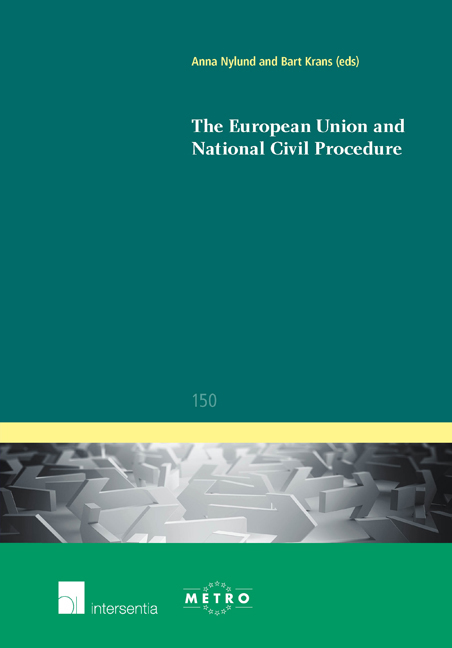Book contents
- Frontmatter
- Contents
- About the Authors
- List of Abbreviations
- The European Union and National Civil Procedure – A Rocky Road or a Smooth Process?
- Some European Challenges for Belgian Civil Procedure
- Danish Civil Procedure and the Internal Market: Impact and Challenges of Sectoral Harmonisation
- European Influences upon English Civil Justice: Tempests or Gentle Breezes?
- European Union and National Civil Procedure: The French Paradox
- The European Union and Civil Procedure from a German Perspective
- Interaction between European Law and Hungarian Civil Procedure Law
- The Impact of EU Law on Dutch Civil Procedure Law
- Norway: An Insider Outside – or an Outsider Inside – European Civil Justice
- Polish Civil Proceedings: How Much Europeanised?
- Slovenian Civil Procedure and the Transformative Power of the EU
- The Curious Incident of the Dog in the Night-Time: Europeanisation of Civil Procedure in Sweden
- Conclusions and Outlook
- Index
- Miscellaneous Endmatter
Polish Civil Proceedings: How Much Europeanised?
Published online by Cambridge University Press: 19 December 2017
- Frontmatter
- Contents
- About the Authors
- List of Abbreviations
- The European Union and National Civil Procedure – A Rocky Road or a Smooth Process?
- Some European Challenges for Belgian Civil Procedure
- Danish Civil Procedure and the Internal Market: Impact and Challenges of Sectoral Harmonisation
- European Influences upon English Civil Justice: Tempests or Gentle Breezes?
- European Union and National Civil Procedure: The French Paradox
- The European Union and Civil Procedure from a German Perspective
- Interaction between European Law and Hungarian Civil Procedure Law
- The Impact of EU Law on Dutch Civil Procedure Law
- Norway: An Insider Outside – or an Outsider Inside – European Civil Justice
- Polish Civil Proceedings: How Much Europeanised?
- Slovenian Civil Procedure and the Transformative Power of the EU
- The Curious Incident of the Dog in the Night-Time: Europeanisation of Civil Procedure in Sweden
- Conclusions and Outlook
- Index
- Miscellaneous Endmatter
Summary
Introductory Ideas
National procedural systems have always played an important role in enforcing European Union (EU) law. The details of these systems have differed substantially in different legal cultures and over time. The common elements that emerge in them are growing in number which can be associated with what is usually called ‘Europeanisation’. If a necessary impulse for domestic change is provided to countries by the EU, it is justified, however, to use names ‘EU-Europeanisation’ or ‘Unionisation’, as put directly by A. Lenschow. Largo sensu Europeanisation, on the other hand, is not limited to the EU-Europeanisation and EU effects on domestic developments. There may be other international impacts from other European fora. The impact of the European Court of Human Rights within European countries can be interpreted as an instance of largo sensu Europeanisation. In Poland, the European Convention of Human Rights was incorporated into laws in early 1990s. The influence of the Court interpreting the Convention on Polish laws can be seen in the introduction of the legal framework for the summons for injunctions against delays in proceedings in 2004 and its significant amendment in 2009. However, these changes are not going to be analysed in this chapter.
‘The EU represents a set of rules, an arena and a discursive framework for domestic actors,’ Lenschow writes, ‘in short a point of departure for impulses that flow top-down, horizontally and ‘round-about’ when impacting on the domestic level’.2 According to Bulmer and Radaelli, ‘Europeanisation is not simply about formal policy rules but about less tangible aspects, such as beliefs and values’. This chapter will focus on the top-down impact of the EU on civil proceedings, ie the penetration of the European dimension into national legal framework for civil proceedings in Poland. It will regard, first of all, the normative (formal) EU-Europeanisation as the process whereby domestic laws and regulations are adapted to conform to EU rules. The normative EU-Europeanisation refers to procedural laws, substantive laws as well as institutional design of administration of justice but the two latter are beyond the scope of this chapter. National law established by the Polish legislature, which is a part of the Polish legal system of a multi-centre nature (multilevel system), binding in domestic territory along with the directly applicable EU laws, is being Europeanised in a literal sense.
- Type
- Chapter
- Information
- The European Union and National Civil Procedure , pp. 115 - 130Publisher: IntersentiaPrint publication year: 2016
- 1
- Cited by



